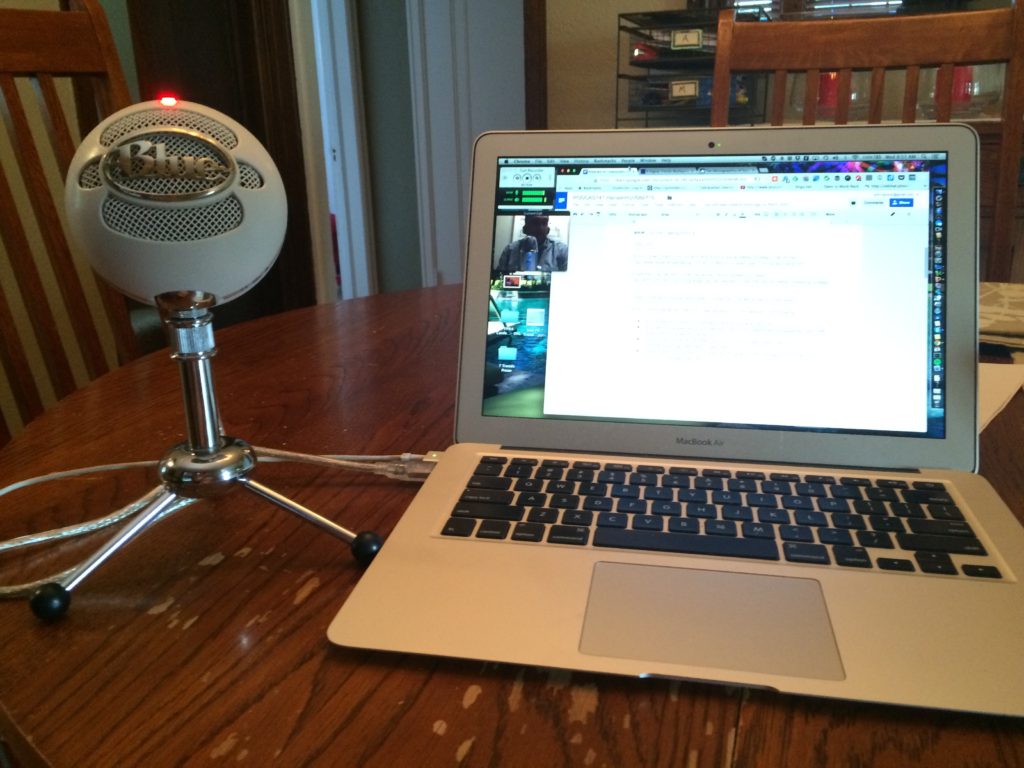It seems like everyone is talking about podcasting right now. Clients are asking about it. Friends are promoting them (on Instagram, no less). And, people are listening. Oh, are people listening. According to Edison Research, 40 percent of Americans 12+ have ever listened to a podcast. And 24 percent have listened to a podcast in the last month.
Podcasting is hardly the little niche tactic it was 8-plus years ago.
And, like I said, more companies are dipping their toes in the podcasting waters. My Talking Points Podcast partner, Kevin Hunt, has managed the Taste of General Mills Podcast for a couple years now. Susan Beatty helped start the Power of Possible Podcast at U.S. Bank. And Walmart’s Outside the Box Podcast is gaining favor as well.

Chances are, you might be thinking about a podcast for your social media program in 2018. If that’s the case, I thought I’d give you eight solid questions to really think about before moving forward and starting that first company podcast.
1 — Do you have the right hardware and software in your possession?
I’d suggest buying some kind of Snowball mic. It’s the most popular brand, and most are very affordable (under $300). I’d also lean toward using Garageband as your editing tool-of-choice–mostly because it’s already on Macs, which most in our industry use on a daily basis. And finally, if you’re thinking about recording remotely, I’d look at RecUp and Zencastr. RecUp is an app you can use to record right from your phone–I’ve had great luck with this in recording a few episodes of the Talking Points Podcast (including this interview with Cydney Wuerffel). And, you can use Zencastr to record remotely from your laptop or desktop–it can be a bit buggy at times, but I have yet to find anything better.
2 — Do your subject matter experts have strong perspectives on timely and relevant topics?
Think about your podcast like a talk radio show—the more interesting the topics and guests, the more listeners you’ll have. I’m a fairly loyal KFAN listener. And sure, I listen because I find some of the hosts entertaining and funny. But, I also listen because they have great guests (Glen Mason, Carl Gerbschmidt and Pat Kessler are among my favorites). Identify the right host and guests, and you’ll have taken a big step toward producing an educational and entertaining podcast.
3 — Do you have resources and people you can call on to help with the technical aspects?
Think through who will be your resource to help produce and edit the show, troubleshoot technology and keep you on strategy. This could be someone within your company. Or, it could be an external vendor. Walmart hired an agency named Omelet to help with its production–outsourcing your entire podcast is a viable option. Whereas, at General Mills, Kevin Hunt does it all, with help from his small team. Don’t underestimate the technical aspects of production. It’s not impossible to figure out on your own–but, you shouldn’t take it lightly either.
4 — Are you sure your company has the ability to sustain a podcast for more than six months?
Building a podcast audience (much like building a blog audience) takes time. I usually advise you wait at least six months (preferably a year) before you really start looking at growth. Unless you’re someone like Walmart of GE, you just can’t expect massive engagement and listenership right out of the gate. It takes time. Be patient. And, make sure your internal partners and executive sponsors are on the same page.
5 — Do you have a solid plan for how you’ll distribute and merchandise the podcast?
Sure, you’ll want to consider your corporate social channels as prime sharing platforms for your podcast. But, don’t forget about setting up podcasting outposts across the web at places like SoundCloud. And, make sure you think about how you’ll embed your podcast into your blog posts–this is a key, and easy, way many will interact with your blog for the first time. Make sure it’s uber-easy (especially on a mobile device).
6 — Have you given serious thought to your podcast’s format?
On the corporate side, most podcasts are going to have a Q&A format (with the exception of more entertainment-focused podcasts like GE’s The Message). Why? Because it’s the easiest to pull off by far–and, really, it’s the norm. However, a solo podcast is not outside the realm of possibility. If you have an internal thought leader or executive you believe can carry their own show (I’m thinking about someone like H&R Block’s Jeff Jones here), I wouldn’t be opposed to that. However, the risk lies in sustainability and availability. Put all your eggs in one person’s basket, and missing a few shows becomes very likely.
7 – Have you thought about how you’ll organize each show?
I’d highly suggest scripting each show—right down to specific intros, links and talking points. This is exactly what Kevin and I do on the Talking Points Podcast. And, I see it as even more of a must-have when you’re dealing with people who might not be used to podcasting or recording a show. If and when you go “off script” (which you will—and should), a script will give you a framework from which to work for each show. It will be an invaluable planning tool, especially with guests as they’ll often want to see the questions in advance of the show.
8 – Have you thought about what your measures of success will be for your podcast?
Page visits (on your blog), subscribers and ratings (iTunes) are the quantifiable metrics to consider. And, you’ll have social signals that will tell you a bit more about how your audience reacts to your podcasts. However, there are other, softer items to consider when measuring the success of your podcast—like relationships and brand affinity.

0 Comments